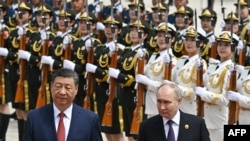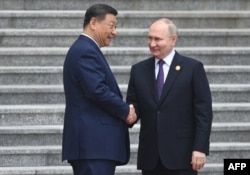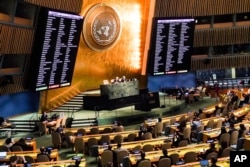Russian President Vladimir Putin used a two-day state visit to Beijing last week to decry the United States and portray Moscow’s actions as a stabilizing force in global affairs.
Moscow and Beijing reaffirmed a "no limits friendship,” including no “’forbidden’ areas of cooperation,” which the two sides announced on February 4, 2022 — weeks before Russia’s full-fledged military invasion of Ukraine.
Despite Beijing’s diplomatic and material support for Moscow’s war, Putin claims Sino-Russian cooperation doesn’t threaten other states.
“It is absolutely crucial that Russian-Chinese relations are not ad hoc contacts and are not aimed against anyone,” Putin said.
“Our cooperation in world affairs is one of the main stabilizing factors on the international stage. Together, we defend the principles of fairness and the democratic world order based on the multipolar realities and international law.”
That is false.
Russia and China are authoritarian states actively seeking to supplant the rule-based international order that U.S. and Western partners have maintained as the “foundation for global peace and prosperity” since the end of the Second World War.
Both China and Russia have acted in defiance of international bodies to assert territorial claims against their neighbors. Russia has consistently violated international law to achieve its goals.
Most notably, Russia’s February 2022 invasion of Ukraine violates the United Nations Charter, as U.N. Secretary General Antonio Guterres told the Security Council in April of that year.
The Charter is the U.N.’s founding document, enshrining principles of international law that bind member states.
Article 2(4) of the Charter prohibits “the threat or use of force in international relations and calls on all Members to respect the sovereignty, territorial integrity and political independence of other States.”
The Kremlin tried justifying its latest war by claiming that Russian-speaking citizens and ethnic Russians in eastern Ukraine faced “genocide” under Ukrainian authority.
The International Court of Justice, or ICJ, the U.N.’s top judicial body, has repeatedly dismissed those claims as baseless.
The ICJ in March of 2022 called on Russia to “immediately suspend” all military operations in Ukraine. Only Russian and Chinese judges voted against the ruling. Russia rejected the ICJ’s ruling although it is legally binding.
Russia’s 2014 seizure of Ukraine’s Crimean Peninsula. Along with the illegal September 2022 annexation of four Ukrainian territories, also violate international law.
International Criminal Court (ICC), an international tribunal that tries individuals “with the gravest crimes of concern to the international community,” issued arrest warrants for Putin and children's rights commissioner Maria Lvova-Belova when it found them guilty of committing war crimes by illegally deporting Ukrainian children to Russia.
The ICC in March charged two top Russian military officials for suspected war crimes in Ukraine.
International investigators implicated Russian military forces in a litany of war crimes in Ukraine.
Nearly 2,000 Ukrainian children have been killed or injured since the escalation of war in 2022, at least two children a day, UNICEF, the UN’s children welfare agency, reported May 13.
At least 30,000 Ukrainian civilians have been killed or wounded by Russian airstrikes, while Ukraine’s military has seen some 130,000 killed or injured, according to a May 20 report by Council on Foreign Relation’s Global Conflict Tracker, which also says the war has left some 10 million Ukrainians displaced and nearly 15 million in need of humanitarian assistance.
Despite Russia’s violations of international law, Beijing, in a joint statement with Moscow, claimed it "supports the efforts of the Russian side to ensure security and stability, national development and prosperity, sovereignty and territorial integrity, and opposes outside interference in Russia's internal affairs.”
On May 16, China accused the U.S. of hypocrisy for calling out “China's normal trade with Russia while pouring unprecedented military aid into Ukraine.”
U.S. assistance for Ukraine, however, is allocated to fund Kyiv’s defense against an invading military, while China’s aid benefits the aggressor.
In March 2022, analysts at Just Security, an online analytical forum, argued that “China’s provision of military assistance to Russia’s operations in Ukraine would run afoul of the core obligations under Article 41” of the U.N. Charter.
Article 41 prohibits provision of aid or assistance to support other states’ efforts to violate the highest legal norms, including wars of aggression — sometimes called “wars of conquest” or “wars of choice” — aggressive military conflicts waged without justification of self-defense.
As Polygraph.info and others have reported, there is significant evidence that China has supplied weapons components to support Russia’s war of aggression.
Although U.S. Secretary of State Antony Blinken told the BBC last month that China is not providing actual arms “to Russia for use in Ukraine,” he nonetheless argued the destabilizing influence of supplying technical components is clear.
“[China’s] helping Russia perpetuate its aggression against Ukraine, but it's also creating a growing threat to Europe because of Russia's aggression," Blinken said, adding it was "helping to fuel the biggest threat to [Europe's] insecurity since the end of the Cold War.”
China has also helped dampen the effect of Western sanctions intended to deprive Russia of the means to wage its war of aggression. Beijing has been providing Moscow with the critical components needed to make weapons, while ramping up trade, especially in oil and gas imports, to help keep Russia’s economy afloat.
Declassified U.S. intelligence estimates that China in 2023 accounted for 90% of Russia’s microelectronics imports needed to produce missiles, tanks and aircraft, and 70% of the machine tools likely used to manufacture ballistic missiles.
Beijing has also provided the Kremlin a diplomatic backup for its war against Ukraine, regularly mirroring Russia’s vote at the U.N. Security Council and using its propaganda machine to boost the talking points intended to justify Russia’s illegal war.
Like Russia, China has also been increasingly aggressive against its neighbors.
Beijing has consistently ignored a key international court ruling and the U.N. Law of the Sea, which define territorial waters of China’s neighbors.
The Chinese coast guard routinely engages in malign activities in the Western Pacific Ocean, and beyond, to assert China's claims to territory and natural resources.
China has also been increasingly forceful in asserting territorial claims, and has land disputes with many of its neighbors, sometimes resulting in minor skirmishes.







